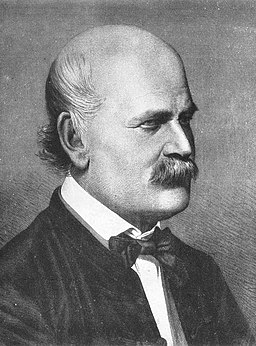One historical example was "germ theory" in the treatment of puerpural or childbed fever.
Ignaz Semmelweiz observed the rate of infection in two separate maternity clinics operated by the Vienna Hospital. One had a deathrate of about 12 percent and the other was relatively low at 2 percent. What could cause the difference?
Semmelweis observed the clinic with the higher death rate was run by medical students and the other by midwives. He also observed an individual who contracted puerpural from a corpse. He noted that the medical students worked with cadavers and the midwives did not. There had to be particles from the corpses that was transmitting disease.
He recommended that doctors wash their hands in water treated with lime and chlorine to disinfect them. At the time, people felt like he was being ridiculous. He lost his appointment at the hospital as a result. This downturn in fortune caused him to sink into depression and he died at 47.
Later Louis Pasteur and Joseph Lister's work confirmed his "germ theory" and the need for handwashing.
The opinion that no one washed their hands and he was wrong was disastrous.
Ignaz reasoning ultimately led to healthier hospitals and lower rates of childbed fever.
There are two sorts of reasoning, deductive and inductive. Semmelweis used inductive reasoning. He used general observations to reach a specific conclusion.
Having medical students to wash their hands before working with patients and observing whether the rate of puerpural dropped would be an example of deductive reasoning. This sort of reasoning is more specific and is used for testing a hypothesis.
Reasoning has the feel of an opinion. But it is not in that a pattern is observed to create a conclusion. Opinion is based on other factors like emotions, or pre-existing thought patterns.
A modern day example is global warming. Global warming is real. It is such a big and difficult problem, it is easier to deny the problem than deal with it. I'm 60. I'll be dead when the problem comes to fruition. So the question is, do we deny a problem because it is easier. Or do we recognize the problem and deal with it before it impacts our great-grandchildren.
No one would consider using a doctor who refused to wash their hands. Go to a physical therapist, watch the latex gloves go on before touching you. Too many have seen themselves or a friend acquire an infection from a clean healthy patient.


Hi Ann - it took a long time for things to sink in didn't it - yet so often pioneers in thought got pushed out by the hierarchy of the day ... fascinating - and yes such a waste that the 'easy' way to have fewer deaths was to wash hands ... sad - Hilary
ReplyDeletehttp://positiveletters.blogspot.co.uk/2017/04/q-is-for-quirky-quizzy-facts-and-quaggas.html
I have friends who believe global warming is cyclical and the warming trend will soon turn itself around. I remember when I was in high school, I saw a National Geographic magazine article showing the Ozone layer and how it had enlarged over a five year period at the South Pole.
ReplyDeleteI saw a documentary on the man (I don't remember his name) who determined babies of mothers with AIDS contacted it in vitro and were dying of the disease, yet no one thought to put gloves on back then when they treated these babies. Today, AIDS patients are often treated with double gloves and many dentists don't want to perform dental work on them. Extreme cases, but at least some of us are not putting our heads in the sand.